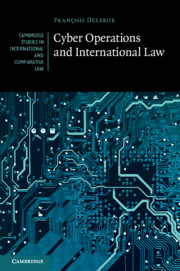Book contents
- Cyber Operations and International Law
- Cambridge Studies in International and Comparative Law: 146
- Cyber Operations and International Law
- Copyright page
- Contents
- Abbreviations
- 1 Does International Law Matter in Cyberspace?
- Part I Attribution
- Part II The Lawfulness of Cyber Operations
- Part III Remedies against State-Sponsored Cyber Operations
- 9 State Responsibility and the Consequences of an Internationally Wrongful Cyber Operation
- 10 Measures of Self-Help against State-Sponsored Cyber Operations
- Part III – Conclusion
- 11 Conclusion
- Appendix Table Assessing the Lawfulness of Cyber Operations and Potential Responses
- Select Bibliography
- Index
- Cambridge Studies in International and Comparative Law
10 - Measures of Self-Help against State-Sponsored Cyber Operations
from Part III - Remedies against State-Sponsored Cyber Operations
Published online by Cambridge University Press: 28 February 2020
- Cyber Operations and International Law
- Cambridge Studies in International and Comparative Law: 146
- Cyber Operations and International Law
- Copyright page
- Contents
- Abbreviations
- 1 Does International Law Matter in Cyberspace?
- Part I Attribution
- Part II The Lawfulness of Cyber Operations
- Part III Remedies against State-Sponsored Cyber Operations
- 9 State Responsibility and the Consequences of an Internationally Wrongful Cyber Operation
- 10 Measures of Self-Help against State-Sponsored Cyber Operations
- Part III – Conclusion
- 11 Conclusion
- Appendix Table Assessing the Lawfulness of Cyber Operations and Potential Responses
- Select Bibliography
- Index
- Cambridge Studies in International and Comparative Law
Summary
The victim State of an unlawful cyber operation may have recourse to extrajudicial measures to compel the wrongdoing State to fulfil its obligations. This chapter analyses the main forms of self-help that may be used by the victim State, namely retorsion, countermeasures and self-defence. Generally, the literature dealing with self-help and cyber operations focuses on self-defence. The conclusion that most cyber operations fall short of an armed attack has led some scholars to, alternatively, consider the possibility of countermeasures as a response to state-sponsored cyber operations. The approach should be reversed, and countermeasures should be considered the primary and preferred form of self-help against cyber operations. This would then mean that self-defence is only considered in exceptional cases. The argument is not that self-defence should be totally discarded, but that applying it as the primary form of remedy should be avoided. Only in some limited cases might self-defence constitute the best, if not the only, option available to the victim State of a cyber operation.
Keywords
- Type
- Chapter
- Information
- Cyber Operations and International Law , pp. 423 - 490Publisher: Cambridge University PressPrint publication year: 2020
- 1
- Cited by

